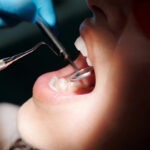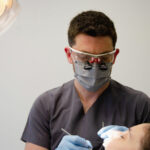 Dental problems take many different forms. Some issues affect the health of your teeth, others affect the health of your gums, and still, others will affect the health and wellness of other structures of your mouth. There are numerous solutions available for advanced dental care, thankfully, including cosmetic dentistry to enhance the overall beauty and aesthetics of your smile and restorative dentistry to address various health problems that you may be facing.
Dental problems take many different forms. Some issues affect the health of your teeth, others affect the health of your gums, and still, others will affect the health and wellness of other structures of your mouth. There are numerous solutions available for advanced dental care, thankfully, including cosmetic dentistry to enhance the overall beauty and aesthetics of your smile and restorative dentistry to address various health problems that you may be facing.
One option for serious dental health issues that may be right for you is dental crowns. We’d like to take a few moments right now to go over the basics of dental crowns and how they may be of great benefit to you given your needs.
About Dental Crowns
Dental crowns are restorations that are used to address major damage or decay when a filling, inlays, or onlays will not suffice. There are different kinds of dental crowns available:
- Metal Dental Crowns – Metal dental crowns are made of soft alloys that are durable and sturdy. These kinds of crowns are generally ideal for the molars and pre-molars.
- Porcelain Dental Crowns – Porcelain crowns are dental restorations made from tooth-colored ceramic materials, allowing the crown to blend in seamlessly with your smile. These are ideal for the most prominent/visible teeth in the mouth.
- Porcelain-fused-to-metal Crowns – These kinds of crowns consist of a metal core with porcelain fused on top of it, allowing for durability and excellent aesthetics at the same time.
General Candidacy for Dental Crowns
The best candidates for dental crowns are people who have suffered major tooth decay or injury that cannot be addressed with other kinds of restorations. The dental crown will relieve any tooth pain or sensitivity while also restoring the overall function of the tooth in the process. Patients should have realistic expectations about what the dental crowns can accomplish when in place.
Dental Crowns for Chips, Cracks, and Decay
When major chips, cracks, or decay affect a tooth, the best option for treatment tends to be a dental crown. This will help reduce soreness of the tooth caused by structural issues and restore overall strength and function to the tooth as well.
Dental Crowns After Root Canal Therapy
A root canal is performed when the pulp within a tooth has been seriously infected. Following the removal of the dental pulp, a dental crown is placed to restore overall strength to the tooth and prevent further issues with the tooth’s internal structures.
Dental Crowns and Implant Dentistry – Individual Missing Teeth
In addition to being used as a traditional dental restoration following tooth damage, dental crowns can also be used as a restoration that is supported by a dental implant, which is an artificial tooth root that is surgically embedded into the jawbone and gum tissue of the patient’s mouth. When a patient is missing a single tooth, an individual dental implant can be placed that is then capped with a dental crown.
Learn More About Cosmetic and Restorative Dental Care
If you would like to learn more about dental crowns and the many other options available for advanced dental care, be sure to contact our Lake Mary cosmetic and restorative dentistry practice today. Dr. Steven Hochfelder looks forward to meeting you in person and helping you achieve the best possible dental health and wellness.














